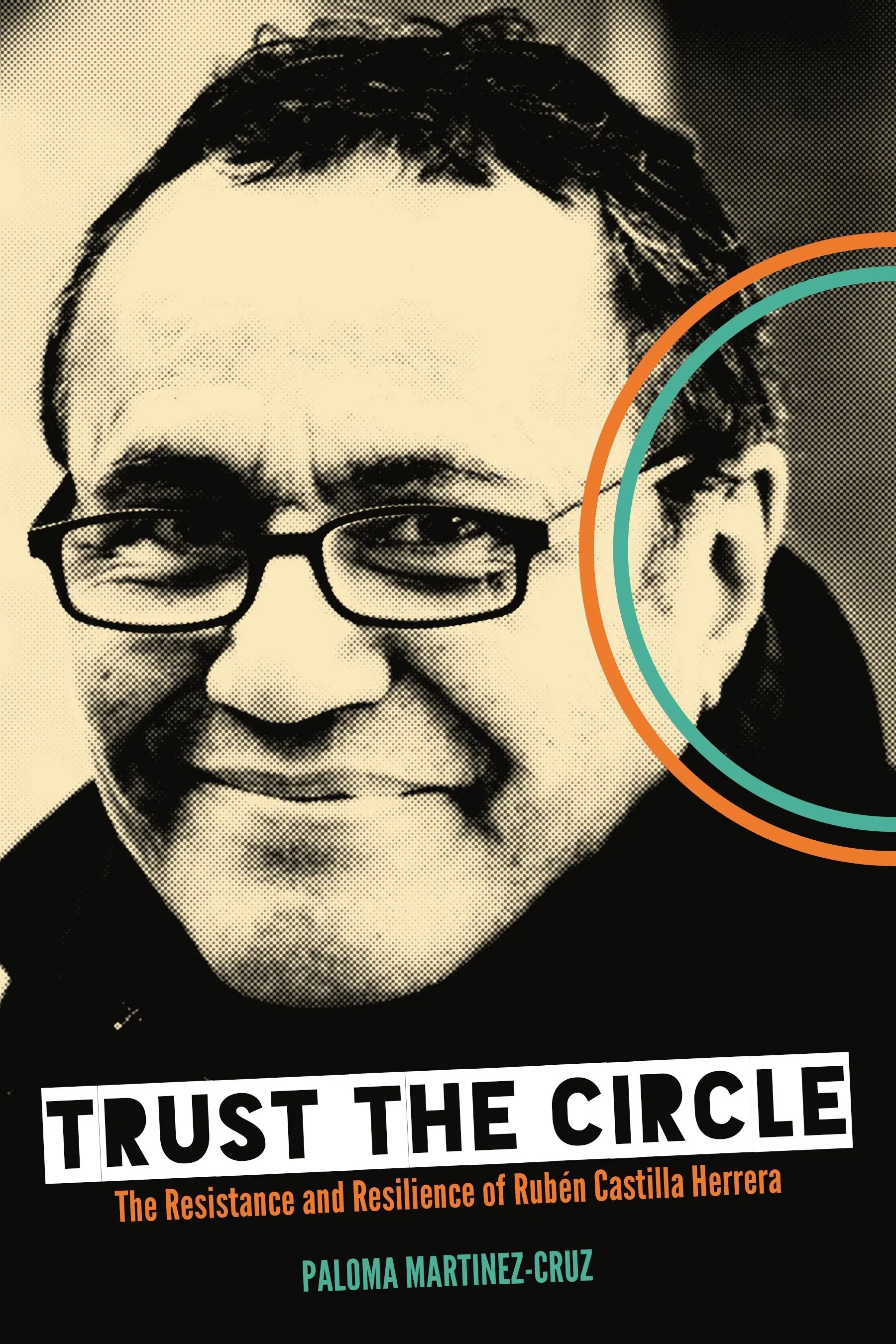Publications
-
When Rubén Castilla Herrera died suddenly in 2019, he left an acute void in Ohio’s grassroots organizing community. Notably at the forefront of many regional social justice campaigns, his life and work still reverberate through the lives of those he fought so hard for: immigrants, refugees, farmworkers, the displaced, and many, many others who refuse to simply comply with injustice.
Synthesizing oral histories, community voices, and ideas from queer Latinidadand migrant worker activism, Trust the Circle details Herrera’s intimate and vulnerable way of seeing the world and his role in it as an agent of change. Here, you’ll learn about:
• His childhood in Texas and Oregon, where he and his siblings were forced into agricultural labor after the early death of their mother, and where Herrera first encountered the Chicano activism of César Chávez and Dr. José Ángel Gutiérrez.
• His move to Columbus, Ohio, and the development of his unique circle-based leadership approach.
• His coming-out as a queer Latinx man in middle age.
• His tireless work toward the end of his life to help provide sanctuary for undocumented migrants during the Trump administration.
Marked by the voices and remembrances of those who knew Herrera best, Trust the Circle is a biography about one grassroots organizer and the profound changes he was able to accomplish. But it’s also about the ways that an intersectional and inclusive approach to organizing can be applied anywhere there is injustice.
-
Poems by Paloma Martínez-Cruz
A chapbook-length poetry collection, Other Bombs (Seven Kitchens Press) explores Martinez-Cruz’ perspective as a Los Angeles-to-Midwest Chicana-Boricua transplant. An edgy, irreverent, but fundamentally hopeful voice and a Spanglish-infused sense of social urgency, these poems decry climate destruction, the dehumanization of migrant lives, the perils of dating White guys, and the politics of possibility that finds cause for celebration in unexpected places.
-
From the racial defamation and mocking tone of" Mexican" restaurants geared toward the Anglo customer to the high-end Latin-inspired eateries with Anglo chefs who give the impression that the food was something unattended or poorly handled that they" discovered" or" rescued" from actual Latinos, the dilemma of how to make ethical choices in food production and consumption is always as close as the kitchen recipe, coffee pot, or table grape. In Food Fight! author Paloma Martinez-Cruz takes us on a Chicanx gastronomic journey that is powerful and humorous. Martinez-Cruz tackles head on the real-world politics of food production from the exploitation of farmworkers to the appropriation of Latinx bodies and culture, and takes us right into transformative eateries that offer a homegrown, mestiza consciousness. The hard-hitting essays in Food Fight! bring a mestiza critique to today's pressing discussions of labeling, identity, and imaging in marketing and dining. Not just about food, restaurants, and coffee, this volume employs a decolonial approach and engaging voice to interrogate ways that mestizo, Indigenous, and Latinx peoples are objectified in mainstream ideology and imaginary.
-
La Pocha Nostra: A Handbook for the Rebel Artist in a Post-Democratic Society marks a transformation from its sister book, Exercises for Rebel Artists, into a pedagogical matrix suited for use as a performance handbook and conceptual tool for artists, activists, theorists, pedagogues, and trans-disciplinary border crossers of all stripes.
Featuring a newly reworked outline of La Pocha Nostra's overall pedagogy, and how it has evolved in the time of Trump, cartel violence, and the politics of social media, this new handbook presents deeper explanations of the interdisciplinary pedagogical practices developed by the group that has been labeled "the most influential Latino/a performance troupe of the past ten years."
Co-written by Guillermo Gómez-Peña in collaboration with La Pocha Nostra’s artistic co-director Saúl García-López and edited by Paloma Martinez-Cruz, this highly anticipated follow-up volume raises crucial questions in the new neo-nationalist era. Drawing on field experience from ten years of touring, the authors blend original methods with updated and revised exercises, providing new material for teachers, universities, radical artists, curators, producers, and students.
-
Paloma Martinez-Cruz argues that the medicine traditions of Mesoamerican women constitute a hemispheric intellectual lineage that continues to thrive despite the legacy of colonization. Martinez-Cruz asserts that indigenous and mestiza women healers are custodians of a knowledge base that remains virtually uncharted. The few works looking at the knowledge of women in Mesoamerica generally examine only the written—even academic—world, accessible only to the most elite segments of (customarily male) society. These works have consistently excluded the essential repertoire and performed knowledge of women who think and work in ways other than the textual. And while two of the book’s chapters critique contemporary novels, Martinez-Cruz also calls for the exploration of non-textual knowledge transmission. In this regard, the book's goals and methods are close to those of performance scholarship and anthropology, and these methods reveal Mesoamerican women to be public intellectuals. In Women and Knowledge in Mesoamerica, fieldwork and ethnography combine to reveal women healers as models of agency. Her multidisciplinary approach allows Martinez-Cruz to disrupt Euro-based intellectual hegemony and to make a case for the epistemic authority of Native women. Written from a Chicana perspective, this study is learned, personal, and engaging for anyone who is interested in the wisdom that prevailing analytical cultures have deemed “unintelligible.” As it turns out, those who are unacquainted with the sometimes surprising extent and depth of wisdom of indigenous women healers simply haven’t been looking in the right places—outside the texts from which they have been consistently excluded.




